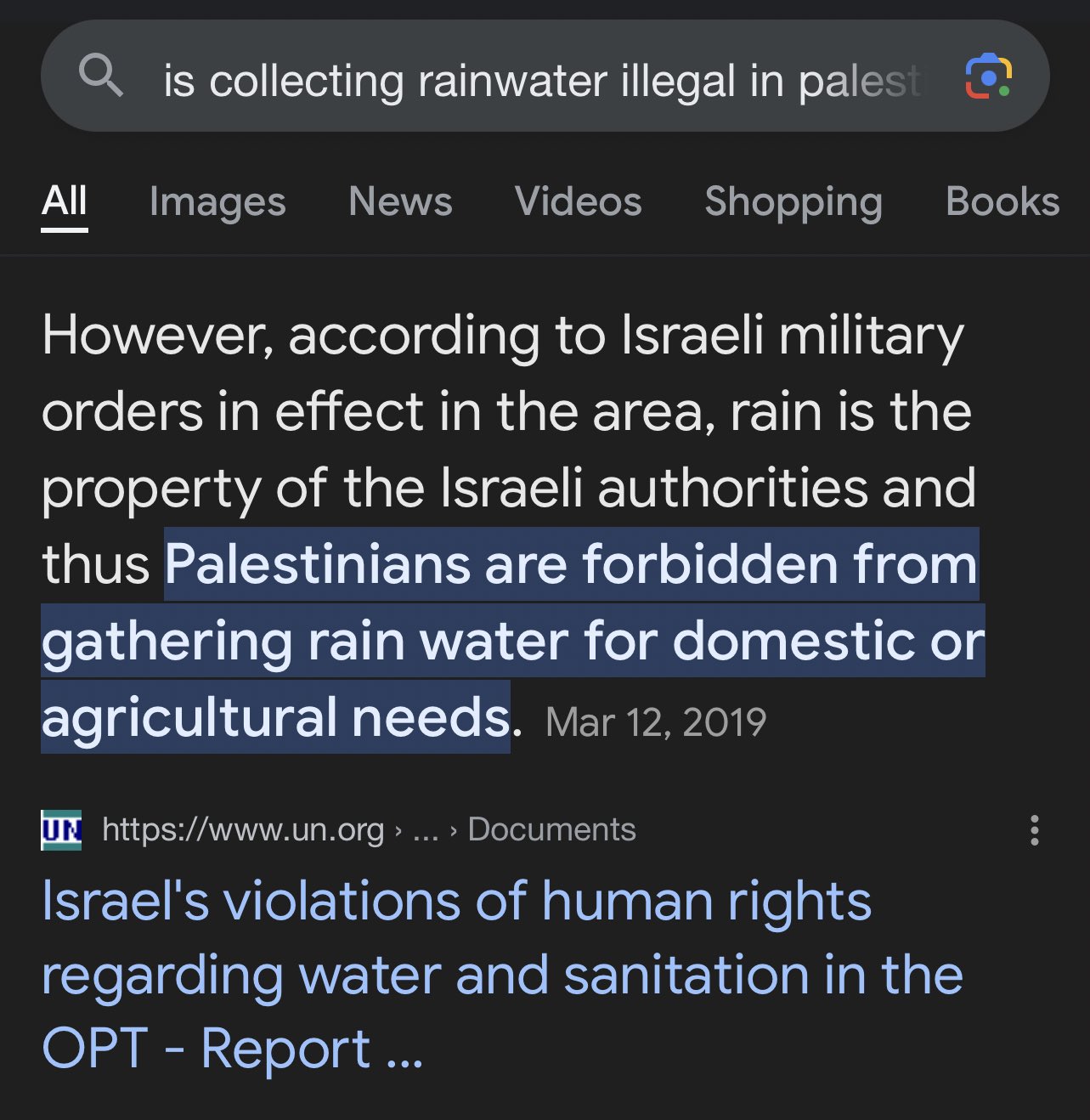this post was submitted on 19 Nov 2023
747 points (100.0% liked)
196
16801 readers
2028 users here now
Be sure to follow the rule before you head out.
Rule: You must post before you leave.
founded 2 years ago
MODERATORS
you are viewing a single comment's thread
view the rest of the comments
view the rest of the comments

Given the context, this seems more evil than is probably intended.
There are laws about collection and storage of rainwater all over the world unrelated to genocide. Water falling from the sky is the source of aquifers, lakes, and rivers that are important for everyone.
The problem here is that the Palestine people aren’t being given control of their water.
Yeah there are good reasons to limit or prevent rainwater collection in order to preserve necessary river systems or agricultural areas etc.
However I highly highly doubt anything good faith is going on here.
The context is very straightfoward. It is an occupied territory. The occupier claims ownership of natural ressources in the occupied territory. This is typical imperialist behaviour and illegal under international law.
https://youtu.be/QZkSRlIs9o0?si=l7jYk8g92oIS4t3b
The evil part is having laws like this and then filling in their water sources with concrete.
Here is an alternative Piped link(s):
https://piped.video/QZkSRlIs9o0?si=l7jYk8g92oIS4t3b
Piped is a privacy-respecting open-source alternative frontend to YouTube.
I'm open-source; check me out at GitHub.
To add what others said (like Israel making up rules for Palestine), the people of Palestine are being attacked and their infrastructure targeted. It is pretty evil to destroy the water supply and then say: "but you can't get it elsewhere :)".
I don't think this is necessarily the case here, but laws like this are often an attempt to offer the appearance of legitimacy to acts of violence (i.e. "yes we imprisoned them but they broke the law!").
and who better to claim ownership over the rain falling on palastinian soil than the israeli government
i dont think you can justify this stuff, at best make it sound slightly less evil
Water for agricultural and domnestic use usually is fed back to the water cycle, though.
Watering my veggies is distinct from e.g. building a dam, or something.
You could, though, for example, set up a large collection system for water that would normally be fed into a tributary that other farmers are using downstream for irrigation. A company with enough resources to collect and bottle rainwater for profit across a large area that would otherwise feed into aquifers could bleed a small farming community dry.
I wouldn't call that "domnestic or agricultural" use anymore.
Right, it's just that not all rainwater collection is inherently domestic or agricultural, and that's why some places (ostensibly, at least) have laws restricting it, with the goal being to keep it feeding into the water cycle and not shipping it elsewhere.
Read the highlighted text in the post again, please.
I didn't miss that part, I'm just saying that usually that's not why laws like this are created. The stated intent of this one is likely something about protecting fragile aquifers and the real intent is gradual genocide.
AFAIK, there is no such laws in Europe. I know for parts of USA and Israel. Correct me if I am wrong.
No such laws in Russia. And it seems no such laws in Poland. No for Ukraine, no for Belarus, Kazahstan even has some bonuses if you collect rainwater, Latviya has some bonuses too.
You are definitely wrong. I work in municipal development and a developer retaining water on site beyond what is necessary to offset their increased impervious cover is something that's highly discouraged and restricted.
Water need to go to the rivers and aquifers, and damming it up for private use is a real problem.
I never seen them before. Too much rainwater is a problem, but not collecting it.
It's illegal for me to have rain barrels off my gutters. I wanted them to use the water for my garden. I'm not in any area with existing water shortage or drought issues either.
It can be actually. People upstream of water sources - often wealthy people with land but sometimes a collective of local farmers - build dams or retaining ponds to save the water for themselves and on a significant scale can limit the amount of water that goes downstream.
Oh I think it’s meant to be just as evil as it looks.
It makes more sense to limit the amount of water collected than to outright banning it tho.
Sometimes.
I work in municipal development and how rainwater is handled is a huge part of my job. It usually comes down to whatever the developer wants is bad.
They either want to collect all water and essentially deny it to everyone else so they can sell it, or they want to pave over everything and refuse to detain stormwater and flood the neighbors.
It's not at all the same thing as Palestinians wanting water for food and crops, but a lot of the time these laws start out as something sensible before being used as a weapon.
What do you mean by "makes more sense"?